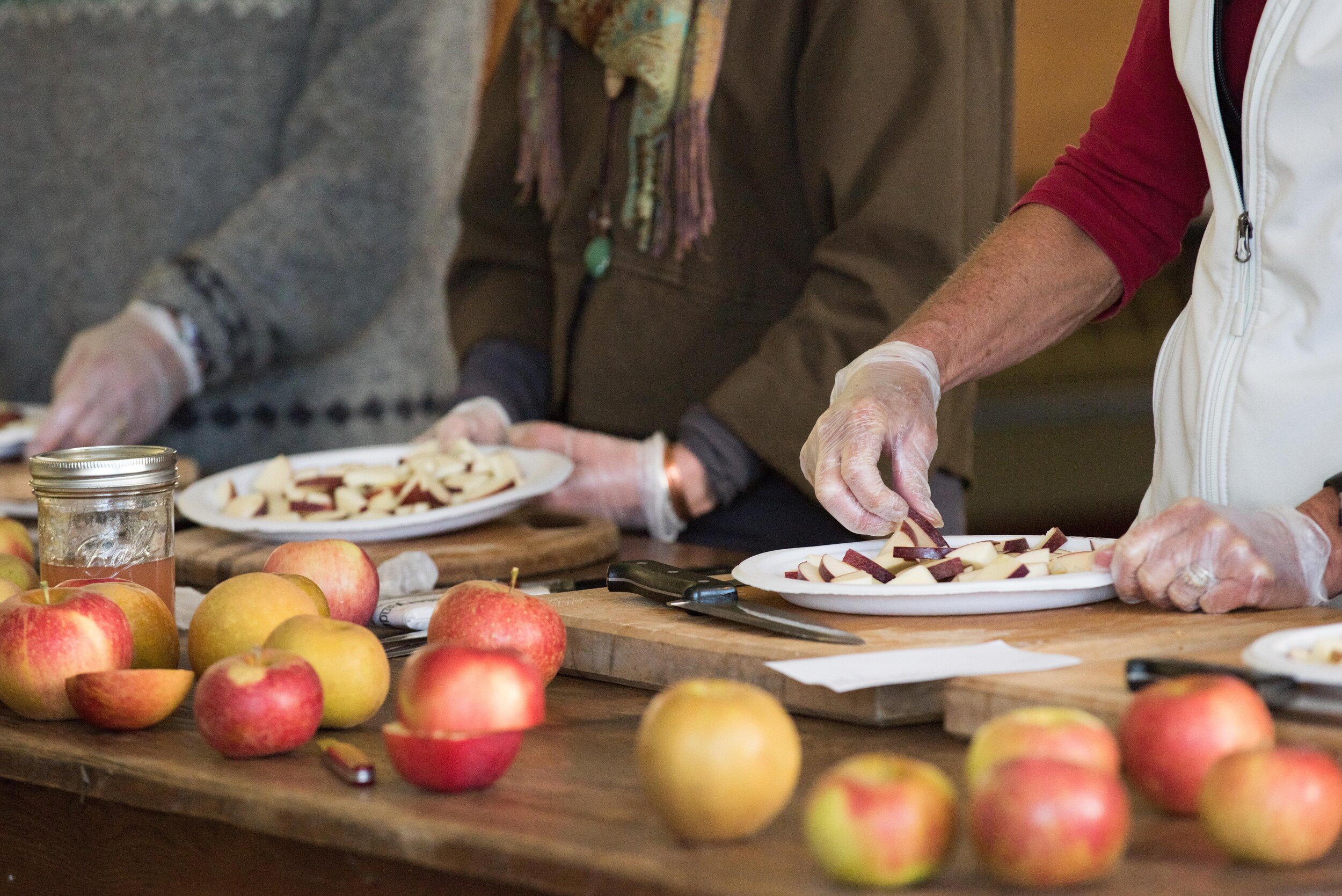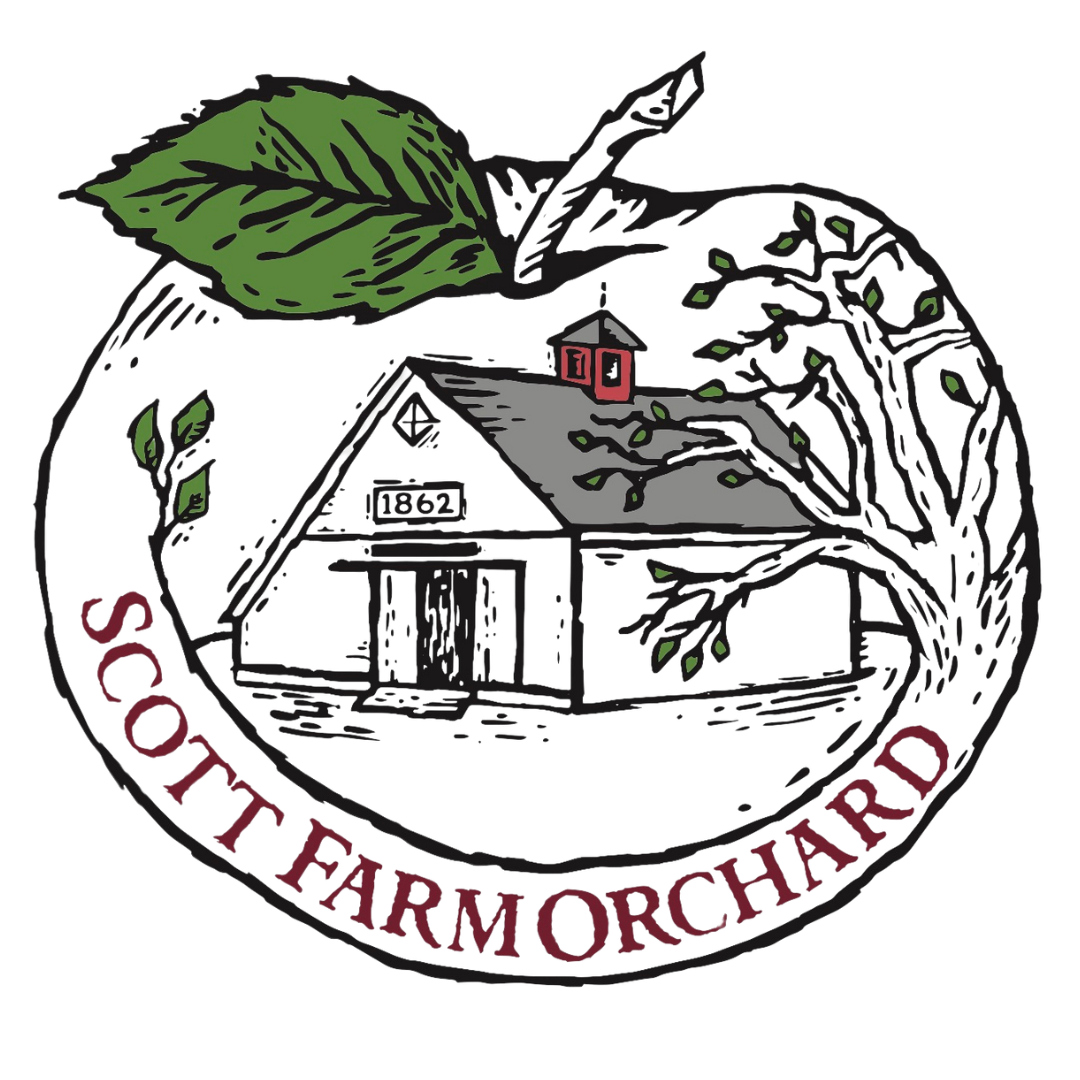
Our Story
Scott Farm is a for-profit working farm of The Landmark Trust USA, a nonprofit historic preservation organization which was gifted the 571 acre property in 1995. We grow 130 varieties of Eco Certified heirloom apples as well as other interesting stone fruit and berries. Each year we plant new apple varieties and other interesting fruit to expand the existing orchard.
The farm itself is something of an heirloom, settled in 1791 by Benjamin Jones and Nathan Adams. Ownership later passed to Rufus Scott and finally to the Holbrook family who expanded and diversified the farm in the 20th century. The orchards were planted in 1911 and soon became the main focus of the farm. In 1995, Fred Holbrook III, pleased with The Landmark Trust USA’s stewardship of his family’s home, Rudyard Kipling’s Naulakha, gifted neighboring Scott Farm to The Landmark Trust USA.
Ezekiel Goodband, an internationally renowned pomologist, managed the orchards from 2001-2019. In the first years of Zeke’s tenure, he cut off the tops of thousands of McIntosh trees and grafted on twig sized scions of heirloom apple varieties. Under his direction, the orchard evolved from one of conventional management and cultivar selection to an ecologically managed heirloom apple oasis.
Today, under the leadership of General Manager Simon Renault and Orchardist Erin Robinson, we continue this legacy and build on it by continuously researching new and interesting varieties of apples and other fruit. The orchard is a living, breathing ecosystem that is managed with biological and cultural methods which produce healthy, high quality fruits. We invite the community to our beautiful grounds to shop, eat, enjoy numerous public events, or celebrate their own events with us.
Our Fruit
Approximately 80% of our crop stays within 100 miles of our farm. We value the personal connections we have with our customers because they are our family, friends, and community. Our mission to grow exceptional fruit with the highest integrity is upheld year round by our small, dedicated staff.
Each year, the day after we close our Farm Market at Thanksgiving, we begin pruning our 3,000 trees by hand with the hope to finish by mid-April. During the bloom we plant new trees and then nurture our crop through summer heat and storms. We start the apple harvest in August and work tree by tree through 130+ varieties. Our fruit is hand-picked and hand-packed onsite under the expert guidance of our Jamaican guest workers as well as local employees. Most of the members of our Grade A harvest crew have worked in the orchards for over 20 years.
We sell our fruit through many wholesale distributors such as Black River Produce, Myers Produce, Red Tomato, Baldor, and Food Connects, and you can find our fruit for retail at local stores and food coops. Many Vermont cideries also use our apples to make unique and interesting hard ciders. We’re proud that all of these efforts are powered by 165 solar panels.
B Corp Certified
Scott Farm became a Certified B Corporation on October 18th, 2017. B Corps are a new type of company that uses the power of business to solve social and environmental problems. B Corp certification is to business what Fair Trade certification is to coffee or USDA Organic certification is to milk.
Scott Farm was certified by the non-profit B Lab to meet rigorous standards of social and environmental performance, accountability, and transparency. We’ve evaluated how our practices impact our employees, our community, the environment, and our customers.
Today, there are over 8,000 Certified B Corps around the globe, including local favorites like Vermont Creamery, New Chapter, Ben & Jerry’s, and Cabot Creamery. We are proud to join them in redefining success in business, so that one day everyone uses business as a force for good. To learn more about our certification, view our B Corp Profile.
Our History
A National Register of Historic Places listed Historic District, Scott Farm has been in active cultivation since 1791. Scott Farm’s story told through its historic buildings is the story of agriculture in Vermont. Through our stewardship of 20+ historic buildings and focus on historic heirloom apple varieties, we are keeping the traditions of rural New England farming alive.
From 1791 to Today
Beginning as a subsistence farm, likely with sheep, the pastures transitioned in the 19th century to an all-purpose farm with a variety of animals and crops. Today, the oldest remaining buildings on the farm were built by Rufus Scott, who purchased the farm in 1845.
Shortly after their purchase in 1903 of Rudyard Kipling’s home, Naulakha, which adjoins the farm to the south, the Holbrook family bought the Scott Farm property. In 1911, they planted the original orchard which is still in use today. The Holbrooks were innovative agriculturalists and marketers, leading Scott Farm to be one of the first orchards to use refrigeration and mail order sales. Scott Farm apples were shipped all across the U.S. and internationally to several countries. The farm even received a US patent for the design of a special shipping crate. When the Academy-award winning movie, The Cider House Rules, was filmed at Scott Farm in 1998, some sets were built according to photographs of the farm and barns found in the farm’s mail order brochure in the 1930s.
In 1995, Fred Holbrook III gifted Scott Farm to The Landmark Trust USA, which had previously acquired and restored Naulakha, designating the property a National Historic Landmark and managing it as an overnight vacation rental. Ezekiel Goodband was hired as the farm’s orchardist for 19 years. His lifelong passion for apples and old varieties took him to abandoned orchards throughout New England and as far as Kazakhstan, the birthplace of apples. The orchard now grows over 130 heirloom and unusual eating and cider apple varieties with a range of color, flavor, and texture far removed from common grocery store varieties. Scott Farm also grows gooseberries, medlars, quince, blueberries, grapes, pears, plums, peaches, cherries, apricots, currants, ginger, hops, and paw paws.
“The glory of the garden lies in more than meets the eye.”





